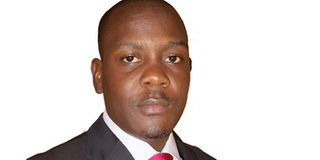There is urgent need to sensitise population on climate change

Mr Mukasa is the director, Health Climate Uganda. COURTESY PHOTO
What you need to know:
- Time has come to change our mindset to protect our country and planet and for this noble cause, every individual should take his or her share of responsibility.
- Strategic action is required both from individuals and the private/public sector to prevent harmful corollaries from climate change to individuals and society at large.
The importance of communicating with the public and engaging stakeholders is fully recognised by the United Nations Framework Convention on Climate Change.
For several decades now, climate change has emerged as one of the most important environmental issues ever to confront humanity. This concern arises from the fact that our everyday activities are leading to changes in the earth’s atmosphere that have the potential to significantly alter the planet’s heat and radiation balance.
Climate change is leading to rise in the earth’s temperature much more than was expected. Glaciers are melting, sea levels are rising, cloud forests are drying and wildlife is scrambling to keep pace. It is becoming clear that humans have caused most of the past century’s warming by releasing heat-trapping gases as we power our modern lives.
Climate change effects have demonstrably over the years hurt, among others, our collective health and the threat for even worse effects is apparently unmistakable. Although climate change related disasters, illnesses and deaths will increase with the temperatures, climate change is expected to also attack human health with dirtier air and water, more flood-related accidents and injuries, threats to food supplies, hundreds of millions of environmental refugees and stress on and possible collapse of many ecosystems that now purify our air and water.
Yet so far, the work done relating to climate change is mainly confined to research, conferences, seminars and workshops. In Uganda, the general population has very little knowledge about the monster that is climate change. The most recent global study by Carbon Brief put the level of awareness about climate change issues in Uganda to below 40 per cent.
Efforts must be taken as early as now to create massive awareness about climate change. A replica of the early 1990s massive anti-HIV/Aids campaign must be urgently commenced. Government authorities and NGOs should take the initiative in this matter. We need to change mindsets.
Changing people’s mindsets and values is a daunting task. I do not have immediate answers as to how it will be achieved. However, one thing for sure is that we need to be bold and innovative in our thinking. We can no longer afford to engage in business as usual. Motivation for voluntary mitigation is mostly dependent on perceived susceptibility to threats and severity of climate change or climate variability impacts, whereas adaptation is largely dependent on the availability of information relevant to climate change.
Strategic action is required both from individuals and the private/public sector to prevent harmful corollaries from climate change to individuals and society at large. There is a pressing need to address issues related to adaptation, vulnerability, and coping in Uganda as admittedly, we are one of the many developing nations with the largest deficiencies in adaptive capacity. To address all these issues effectively, it is essential to deliberately increase awareness regarding climate change in the general population.
Most importantly, efforts must be taken to teach school children about climate changes more extensively. Love and affection about nature should be created amongst them, for that, frequents trips and visits to natural places are important. Incorporation of climate change study in the national curriculum would go a long away to achieve this goal. Emphasis must be put on practical aspects to prevent global warming, for example, by encouraging children to plant and protect trees. It is important because the behaviour of children can be easily changed in early childhood hence education about climate change and its effects should start in the earlier years of schooling.
The importance of communicating with the public and engaging stakeholders is fully recognised by the United Nations Framework Convention on Climate Change. Article 6 on Education, Training, and Public Awareness urges governments to develop and implement educational and public awareness programmes on climate change and its effects, to ensure public access to information and to promote public participation in addressing the issue. This call was recently enhanced by Article 12 of the Paris Agreement to which Uganda is a party.
Time has come to change our mindset to protect our country and planet and for this noble cause every individual should take his or her share of responsibility. It is our moral duty to give our coming generations a safe and healthy future. Everybody must do something and do it now. But to do so, we need to make everybody aware.
Mr Mukasa is the director, Health Climate Uganda




